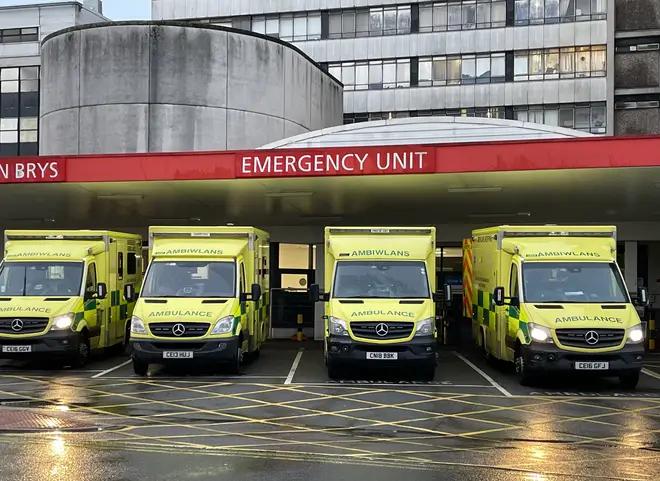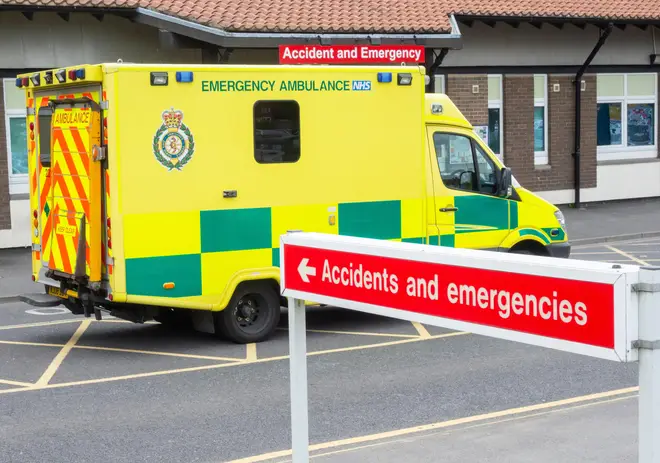
Natasha Devon 6pm - 9pm
21 December 2023, 07:17 | Updated: 21 December 2023, 09:59

Ambulance crews in England have been unable to attend more than 1 in 6 999 call-outs due to delays in handing over patients to A&E, LBC analysis reveals.
The NHS states that ambulances should spend no more than fifteen minutes transferring a patient once they arrive at A&E, but since January 2022, paramedics have been prevented from attending 2,225,000 calls due to jobs which have exceeded this target.
In some cases, hold-ups have been so bad that paramedics have spent ‘the entirety of their shifts’ outside hospitals.
It means around 17% of potential ambulance capacity has been lost over the past two years - a figure which has tripled since before the Covid-19 pandemic.

The data, derived from reports by the Association of Ambulance Chief Executives (AACE), paints an alarming picture for patients. Since December 2022, at least 36,000 people have been put at risk of ‘severe harm’ as a result of handover blockages.
There have even been tragic examples of patients dying in ambulances.
Speaking to LBC's Nick Ferrari at Breakfast, Health Secretary Victoria Atkins said she had called in the five worst performing ambulance trusts into her office to "understand what is happening at their trusts and what will be done to improve that.
Ms Atkins agreed with Nick that the wait times were "unacceptable."
But, she urged junior doctors to "call off the strikes and get back round the table," seeming to place some of the blame for long wait times on them.
"If you take junior doctors out of hospital, by definition that's going to have an impact on how quickly people are admitted and how quickly people flow through hospital."

Health Secretary Victoria Atkins: 'Please call off the January strikes.'
Read More: Labour's Wes Streeting vows to "ramp up" NHS weekend work as part of health overhaul
Sharan Bandesha, national officer for Unison, which represents paramedics and call handlers, told LBC: “In extreme cases they [ambulance crew] are seeing patients deteriorate in the back of their ambulances - and some of them have died.
"Some of them are spending the entirety of their shift waiting to hand over a patient.
“It means that patients are unable to go to the toilet, so they’re having to help them with that, and they’re having to essentially provide nursing care which isn’t their job.
“By being stuck with that patient at the back of an ambulance and feeling helpless for not being able to give them the care they need, they are not able to then go out and attend to other calls, [meaning] their skills aren’t being used. They’re feeling as if they’re letting patients down - and that has a massive mental impact on them."
According to the data, which covers January 2022 to October 2023, the worst month for such delays was December 2022, when almost 1 in 3 calls could not be staffed. This had raised concerns that the NHS could currently be experiencing its most challenging month of the year, especially with junior doctors commencing a 72-hour strike yesterday.

Tom Swarbrick discusses Shadow Health Secretary Wes Streeting’s recent comments on the NHS
Addressing this point, Professor Jason Killens, the AACE’s lead for operations, said: “We’ve seen a sharp increase in delays in the last few weeks. Each system across the country will be working to ensure they’re as resilient as they can be going into the peak of winter and particularly across the next two weeks of Christmas and new year.”
On the impact of the current strike action by junior doctors, Mr Killens added: “There is a risk the strike action will impact the ability for ambulance crews to hand over patients in emergency departments and the flow through hospitals could be impacted by strike action… [but] each of the hospital systems across England will have been making sure they’re as resilient and ready as they can be to maintain emergency care through the strike action.”
Meanwhile, Shadow Health Secretary Wes Streeting said: “It’s frankly terrifying to think that when you call 999 there may not be an answer at the end of the line. This is where we are after 13 years of Conservative mismanagement - that central promise that the NHS will be there for us when we need it has been broken.
“I’ve seen this first-hand. I was out with the LAS on a shift last week [and] I could see the extra pressures they’re under, the emergency departments are under, dealing with delays, difficulties transferring patients, and because of problems in social care, too many people [who are] stuck in hospital when they’re fit for discharge.
“That’s why Labour will train thousands more GPs and provide more care in the community so fewer people need to call for an ambulance, and those that do need an ambulance are reached in time and get the care they deserve.”
Responding to LBC’s findings, a Department of Health and Social Care spokesperson said: “We have prepared for winter earlier than ever before and we are making progress in cutting both A&E waits and ambulance response times.
“Compared to last November, average Category 2 ambulance response times for emergencies including heart attacks or strokes were almost 10 minutes faster this year.
“We know there is more to do and that’s why we’re working to get 800 new ambulances on the road and create 5,000 extra permanent hospital beds, on top of 10,000 hospital at home beds already rolled out, to free up hospital capacity and cut waiting times.”